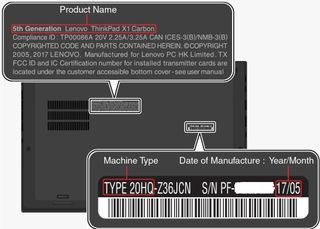If you bought a Thinkpad X1 Carbon notebook within the last two years, your device may be subject to a recall notice. Lenovo is being surprisingly forthcoming on the details of the recall. The company said it has received three reports of its notebook failing due to a loose screw that was left unfastened during assembly. (Insert "Lenovo has a screw loose" joke here.) If the screw contacts the terminals of the battery, it can short the battery and cause it to overheat, potentially leading to fire or explosion. Lenovo said that there have been no incidents of property damage (except to the three aforementioned notebooks) or injury so far.
The machines being recalled were manufactured between December 2016 and October 2017. The Thinkpad X1 Carbon 5th Gen hasn’t been replaced with a 2018 model yet, so if you have an X1 Carbon, even one bought very recently, it’s worth checking your serial number. Find the barcode sticker on the bottom of your laptop and look for the “TYPE” and the last set of digits on the sticker, which denote the manufacture date. The machine is being recalled if it corresponds to the following:
| Machine Type | 20HQ | 20HR | 20K3 | 20K4 |
|---|---|---|---|---|
| Built between | YY/MM16/12 – 17/10 |
You can enter your machine’s serial number at Lenovo’s provided website to confirm if it’s affected.
Lenovo will fix your affected laptop free of charge. The company is handling the fix through scheduled appointments at its service centers and said that repairs should be completable on the spot. You can find your nearest Lenovo service center in the links provided in the recall notice. If you’re in North America, that link is here.

Although this recall isn’t actually a result of faulty batteries or a poorly designed device--it’s a factory assembly issue--recalls due to lithium-ion batteries aren’t uncommon. There have been several highly publicized incidents in the past, such as the Samsung Galaxy Note 7 and “hoverboards” recalls. These led to the devices being banned from air travel.
The high-energy density of Li-ion batteries is the root of their potential danger, and the demand for smaller and slimmer devices means that tolerances, within and without the battery, are sacrificed. The result is batteries that are easier to puncture, short, or overheat.
In North America, product recalls are overseen by the U.S. Consumer Product Safety Commission. Currently, HP is recalling faulty laptop batteries, and Lenovo had a similar battery recall in 2014.
Stay On the Cutting Edge: Get the Tom's Hardware Newsletter
Join the experts who read Tom's Hardware for the inside track on enthusiast PC tech news — and have for over 25 years. We'll send breaking news and in-depth reviews of CPUs, GPUs, AI, maker hardware and more straight to your inbox.
Most Popular



